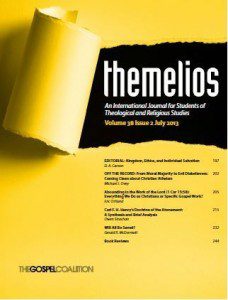 The new issue of the international theological journal Themelios has just arrived. Andy Naselli has the announcement over at The Gospel Coalition.
The new issue of the international theological journal Themelios has just arrived. Andy Naselli has the announcement over at The Gospel Coalition.
Themelios always features a brief essay from editor D. A. Carson of Trinity Evangelical Divinity School. In this issue of the journal, Carson tackles the connection between Christ’s cross and his kingdom. Sometimes, evangelicals try to pull these core New Testament realities apart; Carson wants to integrate them, as you can see:
(e) Increasingly in the NT, the kingdom is distinctively Christ’s kingdom. In many of the parables, Jesus speaks of the kingdom of God. In some, however, such as the parable of the sheep and the goats (Matt 25:31‒46), the King is clearly Jesus. That raises the question as to when Jesus becomes king. At one level, Jesus is born a king (e.g., Matt 2); at another, he enters into his kingship with the onset of his public ministry; at yet another, in deepest irony he reigns from the cross (e.g., Matt 27:27‒53); very frequently in the NT his kingship is thematically connected with his resurrection, ascension, and session at the Father’s right hand, assuring him that all authority is given to him in heaven and on earth (e.g., Matt 28:18). Paul sums up this vision by insisting that all of God’s sovereignty is currently mediated through Christ and that this will continue to be the case until the last enemy has been destroyed (1 Cor 15). That means that Jesus’ mediatorial kingship is contested. The consummation of the ages finally arrives when his foes, including death itself, have been utterly vanquished.
I took a class at TEDS with Carson on the “New Testament Use of the Old Testament,” and this discussion popped up. He considers this relationship in his excellent and readable book Scandalous, which I commend to anyone who wants to better understand this intertwining of themes.
For this latest issue of the journal, I had the honor of contributing an essay on Carl F. H. Henry’s doctrine of the atonement. Though Henry treats the atonement in many places in his 30+ books and hundreds of essays and articles, I had not personally encountered a scholarly treatment of this subject. So, being a Henry aficionado, I decided to write on it. In my own article, I covered Henry’s connection between Christ’s cross and kingdom:
A second strength is Henry’s synthesis of cross and kingdom, staunchly biblical themes that some Christians struggle even today to reconcile. Some emphasize the kingdom; others emphasize the atonement. Henry’s writing is blissfully free of such unbiblical divergence. In his writing, Jesus is the king of the spiritual kingdom, and his death accomplishes the decisive victory of his kingly rule. To conceptualize this, the kingdom seems to provide the framework for the entirety of Christ’s person and work within which the death of Christ, featuring penal-substitution at the core, is the center. Henry’s theological work on this point helps us to dive back into the Scripture and see how closely connected the cross and kingdom truly are. It avoids unhelpful dichotomies even in the present day between “kingdom” people and “cross” people, showing that truly scriptural Christians cannot be one without the other.
You can read the whole journal article here. There is much, much more to engage in Themelios, too.
The foregoing from Carson and Henry points us to a crucial insight, one that may prove uncomfortable for some evangelicals. You can’t be either a “cross person” or a “kingdom person.” In other words, you can’t ignore the cross and zero in on the kingdom if you’re going to be faithful to Scripture. Neither you can celebrate the cross and only casually reference the kingdom. Christ reigns from his cross.
It’s true that, reading the New Testament theologically, you’ll have to do some integrative work. What you’ll find, actually, is that the doctrinal bread crumbs are already there in the text. Think of the following: “To him who loves us and has freed us from our sins by his blood and made us a kingdom, priests to his God and Father, to him be glory and dominion forever and ever. Amen.” (Revelation 1:5-6, ESV)
There is a great deal here to unpack and build upon. If we will do so, I think we will find that our understand of cross and kingdom both are greatly enhanced, and thus our lives, transformed by every word of the Bible, are the richer and deeper for it.











